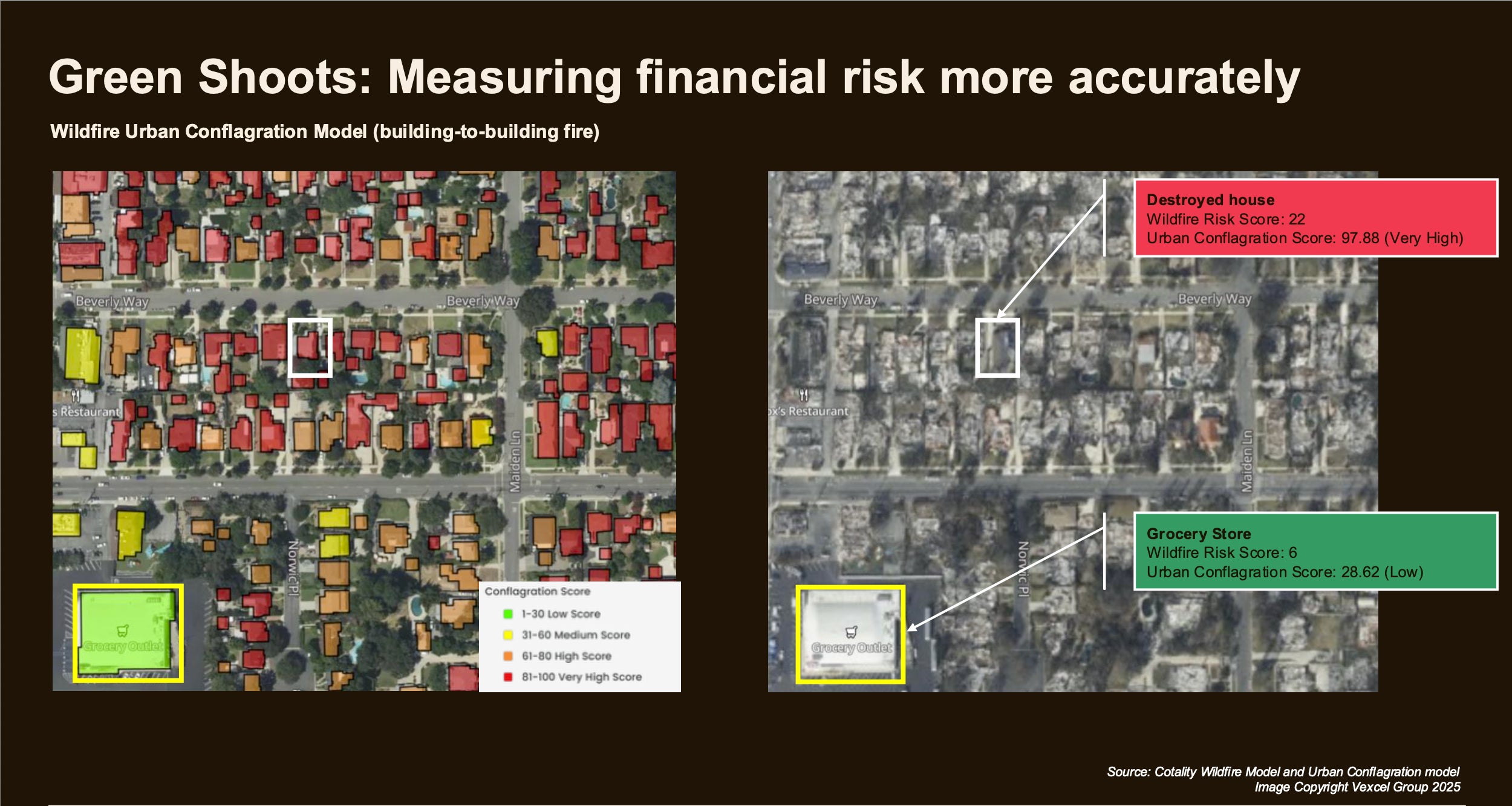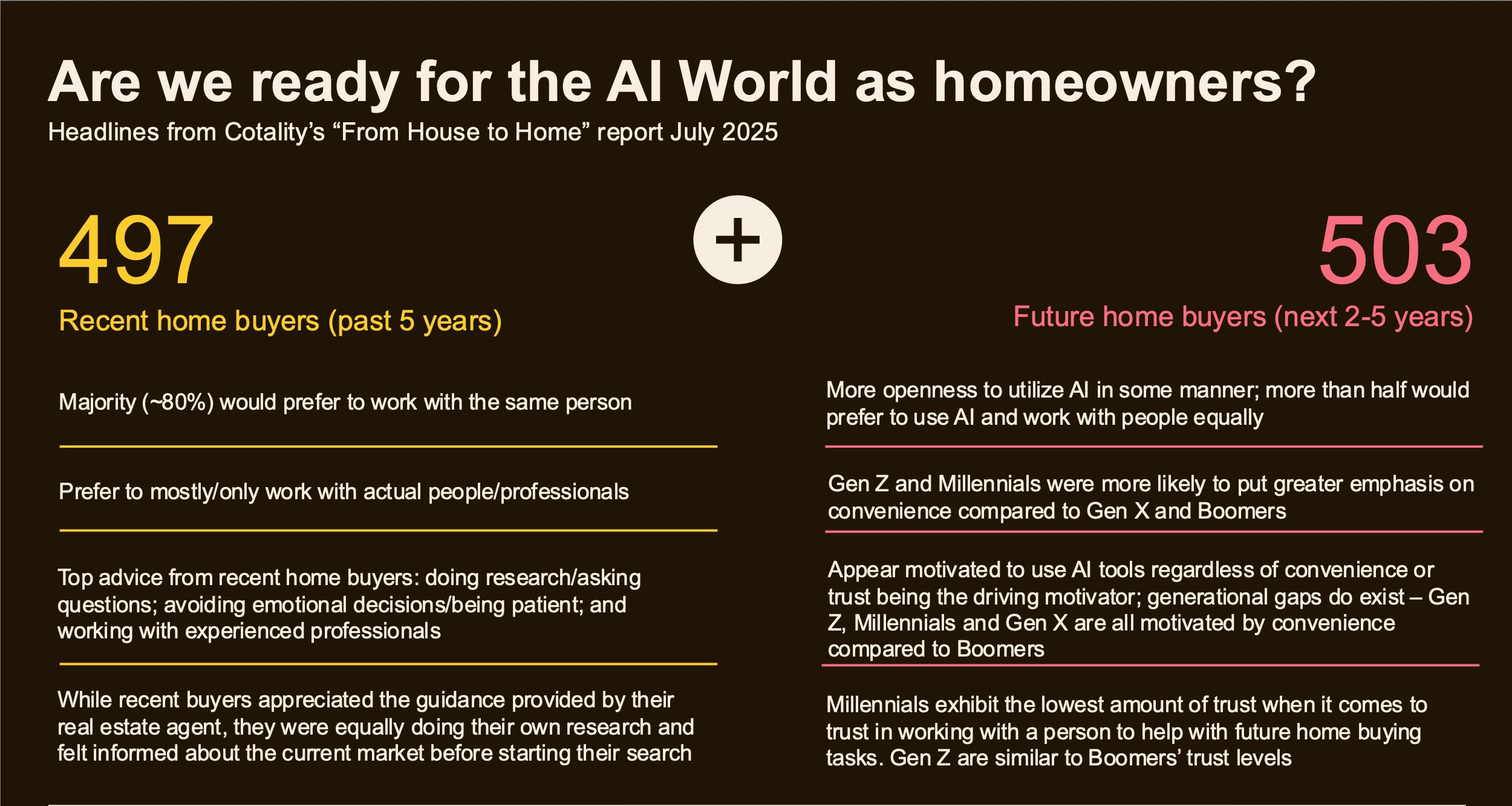Bricks, bytes, and intelligence: Supercharging the built world with AI and smarter data
AI and smarter data are transforming the real estate industry by moving it beyond fragmented, manual processes to a future of proactive, data-driven decision-making.
- Traditional, generalized risk models are no longer sufficient; a new approach uses hyper-local data to reveal hidden risks and opportunities at the individual property level.
- Rather than replacing human expertise, AI serves as a co-pilot for professionals, streamlining time-consuming tasks like listing generation and property inspections.
- The future of real estate is a symbiotic relationship where human expertise is augmented by AI-ready data, empowering professionals while meeting the modern consumer's demand for both personal guidance and in-depth information.


The U.S. real estate market is a massive, sprawling entity, a neighborhood of diverse sectors with a combined value of approximately $97.1 trillion. From the $48.8 trillion single-family sector to the $22.4 trillion commercial space and the $9.7 trillion multifamily segment, this economy is built on a foundation of tangible assets; the "bricks" of our built world. Yet, for all its size and significance, this vast landscape is in the early stages of a profound digital transformation. Its fragmented nature presents a significant challenge, with disparate data sources, siloed information, and manual workflows hindering efficiency and creating a reliance on incomplete assessments.
This fragmentation is the primary barrier to intelligent, data-driven decision-making. Information about a property’s characteristics, its financial history, and its potential risks exists across a multitude of sources, from tax records and public databases to satellite imagery and on-site inspections. Without a unified platform, professionals in every sector (from real estate agents and lenders to investors and insurance carriers) are forced to navigate a complex, time-consuming web of data collection and analysis. The solution lies not in simply digitizing old processes, but in a complete re-engineering of workflows, powered by AI and smarter, more granular data.
Cotality's platform provides the crucial missing link, moving the industry beyond fragmented data and toward a future where every brick is connected to a byte, and every byte is infused with intelligence. By consolidating over 100 billion data points and applying advanced analytics, the platform offers a comprehensive and precise account of property-level risk and opportunity.
This data is the foundation of a new era of proactive decision-making that transforms how professionals operate, enabling them to become "AI superheroes" in their respective fields.
The power of granular data
To truly understand a property and its surrounding environment, we must move past generalized risk assessments. Traditional models often rely on broad, regional overlays or historical data, providing a picture that is often incomplete and sometimes misleading. A property's true risk profile is influenced by highly specific, hyper-local characteristics.
Consider the complexity of urban wildfire risk. A general wildfire hazard score might group a whole neighborhood together, but as seen in a recent Cotality analysis, this is not the full story. A destroyed house in one area had a Wildfire Risk Score of 22, but its Urban Conflagration Score (a model that measures building-to-building fire spread) was a very high 97.88. A nearby grocery store, while having a similar low Wildfire Risk Score of 6, had a low Urban Conflagration Score of 28.62. The difference? Specific factors like building materials and surrounding vegetation. This illustrates how a general score can miss the true threat of a building-to-building fire, a risk that would have been completely overlooked without granular, precise data.
This granular data enables a new level of strategic foresight. The Town of Paradise, for example, used this type of detailed analysis to create a blueprint for rebuilding after the 2018 wildfire that impacted over 18,000 properties. By focusing on three areas, 1) resilient properties (using standards from the Insurance Institute for Business & Home Safety), 2) smart town planning, and 3) perimeter planning, the town was able to create a plan to reduce wildfire risk by 75% and lower insurance premiums by up to 55%. This is a testament to the power of a data-driven approach that moves beyond broad assumptions to actionable, property-specific solutions.
Similarly, in California, homeowners can reduce their wildfire insurance premiums by up to 20% by implementing resiliency factors such as ensuring a fence is 12 feet away from the home or that no combustible materials are within 5 feet of the structure. Cotality's platform, utilizing advanced image analytics, can identify these specific factors, providing a direct, data-backed path for homeowners to mitigate risk and reduce costs.
Making professionals "AI Superheroes"
The ultimate goal of this data transformation is to empower the people who drive the real estate economy. Rather than replacing human expertise, AI and smart data serve as powerful co-pilots, supercharging productivity and decision-making for a wide range of professionals. From agents to appraisers, and from lenders to home improvement contractors, Cotality's CoreAI platform is designed to make every user an "AI superhero."
One of the most time-consuming tasks for a real estate agent is creating a property listing. This process, which can take hours, involves manually gathering information, writing descriptions, and compiling data from various sources. With AI-powered listing generation, this workflow can be streamlined to 5 minutes or less. The platform can automatically pull and synthesize property data, generating compelling and accurate listings with minimal human intervention. This frees up agents to focus on what they do best: building relationships and closing deals.
Home inspectors can also see a dramatic reduction in their workload. A home inspection, which is a critical step in any real estate transaction, can take hours to complete and even longer to document. AI-powered tools can cut this time in half by assisting with on-site data capture and report generation. Furthermore, the creation of a "digital twin" of a property allows for the internal condition to be captured and documented in a comprehensive and easily accessible format, ensuring no detail is missed.
At the core of this transformation is CoreAI, a powerful engine that assists users with everything from understanding their market position and identifying new leads to analyzing and mitigating risk on an entire portfolio. The system is designed to provide comprehensive, precise insights that translate complex data into clear, actionable intelligence, supporting a wide range of business needs.
The human-AI partnership: What homebuyers really think
The shift toward an AI-powered real estate ecosystem isn't just about technology; it's about people. A July 2025 "From House to Home" report from Cotality, based on a survey of 497 recent homebuyers and 503 future homebuyers, sheds light on how consumers feel about this new AI-driven world.
The survey revealed a clear preference for a hybrid approach. The vast majority of respondents, around 80%, would prefer to work with the same person throughout their home buying journey. A significant number also stated they would prefer to work mostly or only with actual human professionals. This underscores the enduring value of trust, personal guidance, and human expertise in a high-stakes transaction like buying a home.
Interestingly, while recent buyers deeply appreciated the guidance provided by their real estate agents, they were also equally engaged in their own research and felt informed about the current market before they even began their search. This indicates that the modern homebuyer is proactive and well-researched, which makes the partnership with an AI-equipped professional all the more powerful.
The survey also highlighted a growing openness to AI tools. More than half of the respondents said they would prefer to use AI and work with people equally. This sentiment was particularly strong among younger generations. Gen Z, Millennials and Gen X were more likely than Boomers to emphasize convenience as a key driver for adopting AI tools. This generational gap is notable, but what's even more compelling is the overall motivation to use AI, regardless of age. While Millennials exhibited the lowest amount of trust in working with a person for future home buying tasks, Gen Z's trust levels were similar to those of Boomers, suggesting that the integration of AI is not a threat to the professional relationship but rather a natural evolution of it. The data shows that the future of real estate is a symbiotic relationship where human expertise is augmented by AI-ready data.
The Cotality & Snowflake blueprint: A data platform for the AI world
Crafting agentic AI for the real estate industry is a complex, overwhelming task. But you don't have to face it alone. Cotality provides the essential tools to build your own agentic AI solutions.
Cotality’s vision for this future is realized through a powerful partnership with Snowflake. By making Cotality AI ready data available in the Snowflake AI Data Cloud, Cotality can meet clients where they are, providing a single, connected environment where data is not just ingested and stored, but made actionable. This blueprint provides a clear path for professionals to not only navigate the current market but to build the AI-powered solutions of the future.
The platform makes it easy to find "AI Ready" data, eliminating the need for complex and time-consuming data preparation. This allows clients to immediately begin building their own AI agents using a library of best-in-class data assets. The standardized delivery and secure clean rooms on the platform streamline workflows and facilitate seamless collaboration, breaking down the fragmentation that has long plagued the industry.
By providing up-to-date data, models, notebooks, and dashboards – along with our new, entity resolution CLIP app – on Snowflake’s platform, Cotality significantly accelerates the time it takes to glean critical insights. It reduces the manual effort of data collection and analysis, allowing professionals to spend more time on strategic thinking and client-facing activities. This comprehensive approach ensures that data security is paramount, providing a trusted environment for data application and collaboration.
Your path to an intelligent future
The U.S. real estate market is on the cusp of a profound transformation. The future belongs to those who recognize that the old ways of working with fragmented data and manual processes are no longer sustainable. By embracing a new paradigm of "bricks, bytes, and intelligence," professionals can move beyond merely reacting to market conditions and instead proactively shape their strategies.
Cotality provides the foundational data and advanced tools needed for this journey. By offering a comprehensive, granular, and AI-ready platform, it empowers professionals to transform their operations, unlock new opportunities, and build a more resilient and profitable future. By making the hidden visible, Cotality helps you protect your bottom line, gain a competitive edge, and ensure your assets are valued for what they are truly worth. This is not just a technological shift; it's a strategic imperative. The time to build a smarter, more connected world is now!













